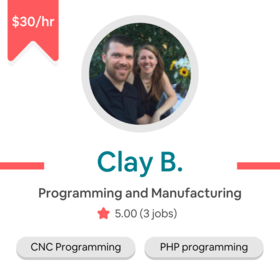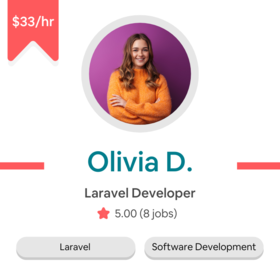













Ruby on Rails comes equipped with every tool a developer may need to build great web apps on both the front and back end. Cad Crowd staffing agency offers personalized solutions to help your company hire the most talented and experienced Ruby on Rails developers and kickstart your web app development.
Regardless of what type of web app you build, the development is essentially divided into two sections: front-end or client-side and back-end or server-side. Ruby on Rails (sometimes referred to as just "Rails") is a full-stack web app framework, meaning it handles both front-end and back-end developments with little to no additional tools. It does everything from managing databases and rendering HTML templates to creating security shields against attacks, sending/receiving emails, and all else in between. Ruby on Rails is part of the technology stack used by large companies such as Airbnb, Crunchbase, Shopify, Twitch, and Dribble, to name a few.
Ruby on Rails is an "opinionated" framework. One of its primary purposes is to offer an easier way for developers to write web apps because the software makes assumptions about what the developers need in the first place. Rails assumes that there's always the best, quickest, and most effective way to achieve a result in every web app development. In fact, the framework is designed to encourage developers to follow the suggestions and discourage the use of alternative methods. A notable advantage is that developers can accomplish more despite writing less code in the process.
Increasing productivity by reducing development time is the main goal. Ruby on Rails does it by implementing two basic principles:
If you think the combination of opinionated framework and COC principle allows for faster web app development, you're right. However, it comes with a pretty substantial downside: a lack of creativity. Beginners will appreciate the helpful nature of Ruby on Rails, but experienced developers may see this as somewhat of a pothole in the road, and for good reasons. There are times when developers must deviate from the conventions. You want your app to be distinct enough from those of your competitors yet remain manageable and user-friendly.
Cad Crowd understands the concern well, and that’s why we recommend hiring only experienced developers when your framework of choice is Ruby on Rails. Thanks to their familiarity with the system and overall coding expertise, experienced developers know when (and how) to disregard the suggested convention without creating a development bottleneck.
As a company running a business, you want the web app to be unique. Rails discourage the impulse for deviations, but making just enough changes means you'll have an app that stands out from the crowd without sacrificing all the speedy development benefits of the framework. Experienced developers make the deviations with care so they can still use all the curated stacks. In contrast, beginners may skip all the possible beneficial modifications and stick entirely to the convention. Although this is hardly a bad thing (and certainly not a mistake), you can do much better and actually use Rails to its full potential if you hand it over to an experienced professional.
According to the Stack Overflow Developer Survey (2023), Ruby on Rails ranked 18th of the 34 most common web frameworks and technologies. It was used by around 5.5% of respondents, a very low percentage (compared to Node.js and React at the top two positions with more than 40% each), but still higher than Gatsby and Drupal combined. It's not as popular as it used to be, and considering how the framework actually still works great by any measure – if not better than most for full-stack development – the only possible explanation is that Ruby on Rails simply has been drowned out by mere noises.
It wouldn't be entirely wrong to say that the framework built a large portion of the foundation of Web 2.0, mainly before 2010 when Rails was a bullet train among horses. Starting around late 2012, Ruby on Rails gradually disappeared from the main discussion. And before long it became clear that the framework was not in its golden days anymore. Numerous newer frameworks have come to the surface since then, and yet Rails is still here and actively developed by over six thousand contributors.
However, in terms of features, it really is difficult to pinpoint what went wrong simply because there were never any. Everything good about Ruby on Rails is still here, and many of the drawbacks have been properly fixed and improved.
Cad Crowd has been in the business of connecting employers with developers from all around the world for 15 years, long enough to see Ruby on Rails sitting among the most widely used web technologies and frameworks just before it started to decline in popularity. But being commonplace is not always synonymous with greatness. Ruby on Rails is still an excellent choice for companies in need of developing fast, reliable, user-friendly, and easy-to-maintain web applications for businesses.
Our recruiters understand that there aren’t too many new developers eager to specialize in Ruby on Rails. Looking for a truly capable one is not as easy as it used to be, but it’s important to emphasize that the same basic skill requirements still apply today. Here’s a non-exhaustive list of technologies that a good Ruby on Rails developer should master:
Every once in a while, our recruiters come across candidates with skill sets that exceed the requirements. Apart from the basic technical competence, such as the ability to write clean code and familiarity with testing/debugging, they possess additional points, for example:
As with just about every hiring process, candidates' resumes often present uncertainty in their skill sets (experience levels, work history, etc.) in the sense that there might be some exaggerations, such as unverifiable references and poorly defined involvement in past projects. Cad Crowd always refrains from selecting candidates solely based on what they wrote in their portfolios.
Skill-based hiring is the only way to go. Instead of relying on the already available information, we can help you devise specific pre-employment assessments and preliminary interviews to evaluate the candidates' technical competence. Some tests are designed to help you get insight into candidates' soft skills, such as problem-solving and critical-thinking abilities.
Feel free to give Cad Crowd a call or drop an email inquiry at our inbox. We'll listen to your requests and analyze your hiring needs carefully so the custom staffing solution we offer may address every concern and that our team can make sure the candidates we deliver can bring many positive contributions to your project right away.
Ready to harness the power of Rails for your next web or mobile application? Cad Crowd's network of seasoned Ruby on Rails developers is here to help. From startups to established enterprises, our experts have crafted dynamic, user-centric applications that drive results. Don't get left behind in the digital race. Partner with a Rails developer from Cad Crowd today and turn your vision into reality. Request a free quote now and discover how we can elevate your digital journey.


